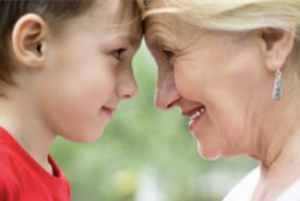By Eva Wang
Author’s Note: I am a third-year Honours Health and Society student at McMaster University. I am passionate about how society and students like myself can provide a more inclusive environment for seniors.
Is there a time when seeing your nanny’s sweater brings back your memory of her? Or how do you feel when devoting time to caregiving or talking to older adults? Ever wondered how they feel in the process?
Many may think that the generation gap between the young and the old can present significant challenges. Widening differences between cohorts growing up in disparate historical times can lead to different styles of living, misunderstandings, and intergroup biases. Through the rapid change in family structures and societal norms, it is increasingly common for the younger and older generation to live separate lives with little or no interaction with each other’s world.
Yet, it is undeniable that the intergenerational connection can help both the young and the old feel cared for and valued, thereby promoting empathy and understanding. Older adults are commonly viewed as wise and experienced; the younger generation can benefit from their wisdom to better thrive in the modern world. Through family and other informal ties, older adults can pass on their knowledge and perspectives, thereby strengthening cultural heritage, family history, and resilience. Skills can be passed on through innumerable joint activities, such as cooking brownies or ramen, building a birdhouse, solving a jigsaw puzzle, or meandering through the woods. In the midst of such concrete projects, youth can learn through storytelling about adapting to change, making do with little, learning from mistakes, and fostering social relationships.

Friendship between youth and the old can make the community stronger and enrich social cohesion. Such bonds can create and embrace meaningful connection that goes beyond age, ethnicity, culture, or background. When people from different generations come together, they bring different perspectives and experiences which lead to mutual learning and maximize the sharing of knowledge. This can provide a greater sense of belongingness, companionship, and willingness to work toward positive changes.
Children are full of curiosity and enthusiasm, and older adults guiding them to learn and explore the world can foster a deeper sense of appreciation and helps older adults to reminisce about their past experiences. The improvement of self-esteem and reduction of social isolation in older adults helps them to find meaning and purpose. These shared experiences strengthen bonds between generations and leave remarkable, yet long-lasting memories to learn from each other while being open-minded to new perspectives. As we move forward, building the bridge and nurturing the strong relationships across generations that transcend age brings vibrant, inclusive communities to allow our future generations to thrive and further their development.

Useful Resources
- What If Older and Younger Generations Worked Together to Solve the Problems that No Generation can Solve Alone? Cogenerate.org
- Benefits of Intergenerational Connections.
- Intergenerational Connections (British Government).
- 7 Ways Intergenerational Connections Promote Seniors’ Health
- Bonds Between Youth, Seniors Can Boost Mental Health, Says Health Sciences Prof (Brock University)






